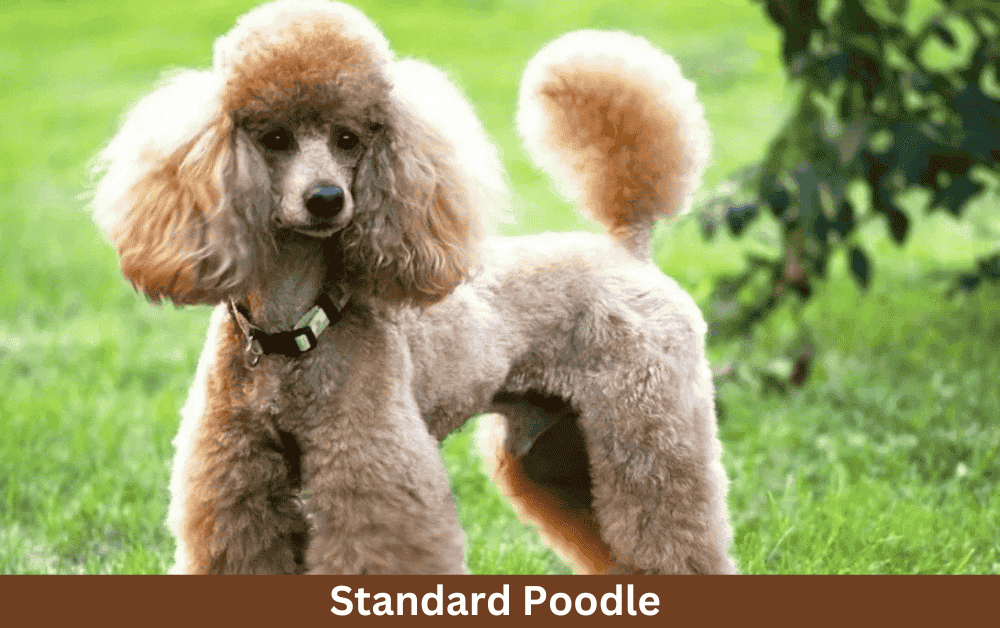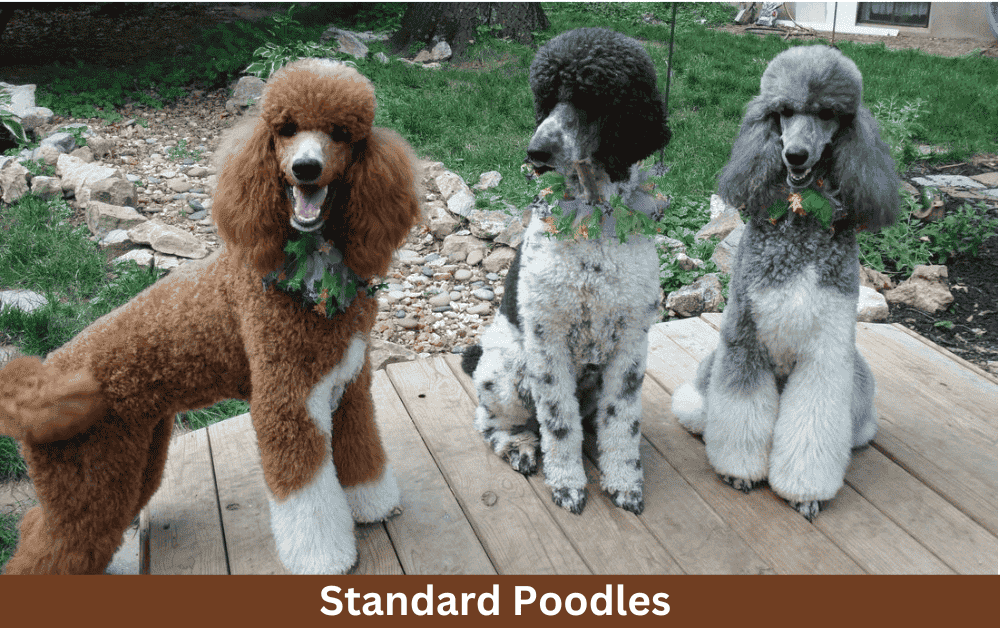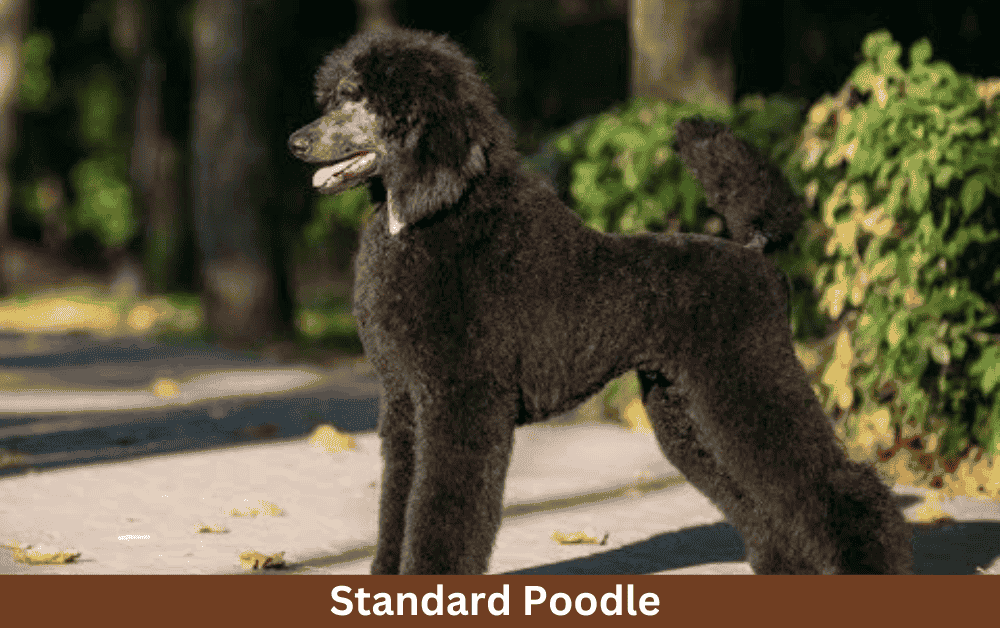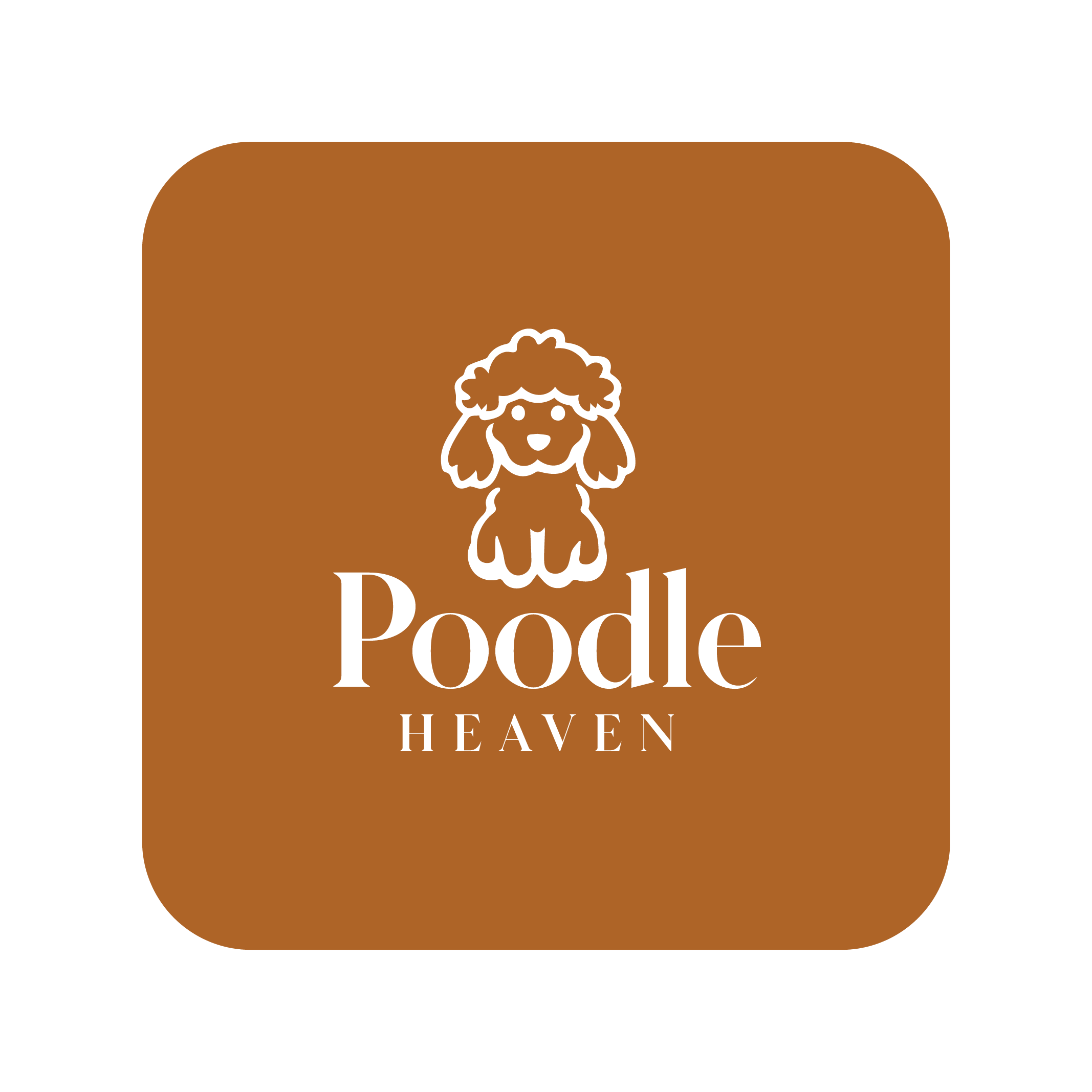Introduction to Standard Poodles
These energetic dogs do best in active homes. They perform well in agility training, dock diving, and even therapy work. However, their intelligence has a downside—if they don’t get enough mental exercise, they may chew furniture or bark too much.
Standard Poodle Quick Fact Table
| Category | Key Facts |
|---|---|
| Origin | Germany (15th–16th century); bred for duck hunting. Name from German “pudeln” (“to splash”). |
| Lifespan | 12–15 years with proper care. |
| Size | 18–24 inches tall; 45–70 lbs (AKC-recognized as the original working size). |
| Temperament | Intelligent, friendly, eager to please. Needs mental stimulation to avoid boredom. |
| Exercise Needs | 60–90 mins/day (walks, swimming, agility). High energy, excels in dog sports. |
| Grooming | High-maintenance: brush 3–4x/week, professional trim every 4–6 weeks. Regular ear/teeth care. |
| Health Concerns | Hip dysplasia, bloat (GDV), Addison’s, PRA, epilepsy. Buy from health-tested breeders. |
| Diet | High-protein (20–30%), portion-controlled meals. Avoid toxic foods (chocolate, grapes). |
| Training | Easy to train; thrives on positive reinforcement. Early socialization is critical. |
| Good For | Active families, therapy work, agility, hypoallergenic homes. |
| Behavioral Issues | Separation anxiety, barking, chewing if under-stimulated. |
Origin and History
The Standard Poodle dog originated in Germany during the 15th–16th centuries when hunters bred them to retrieve ducks from water. Their name comes from the German word “pudeln” (meaning “to splash”), which highlights their skill in water. Their thick, curly coats kept them warm in cold lakes, and their webbed feet helped them swim faster.
By the 18th century, the French adopted them as their national dog. Aristocrats loved their elegant looks and created fancy grooming styles. The famous Poodle clip wasn’t just for show—it had practical use. Hunters shaved the hind legs to help the dog swim better but kept fluffy pom-poms around joints to protect them from the cold.
Today, Standard Poodle puppies work as service dogs, win shows, and make loving family pets. Their journey from German hunting dogs to all-around talented companions proves how adaptable they are.
Did You Know? The AKC recognizes three Poodle sizes (Standard Poodle, Miniature Poodle, and Toy Poodle ), but the Standard is the original working breed.
Standard Poodle Life-span
The Standard Poodle dog has a life span of 12 to 15 years. These dogs are generally healthy but can develop certain genetic conditions. Proper diet, exercise, and regular vet check-ups help them live longer. They are intelligent, active, and social dogs. With good care, they often remain energetic even in their senior years. Early detection of health issues can further extend their lifespan.
Standard Poodle Temperament

Standard Poodle puppies are friendly, smart, and easy to train. They love being part of family activities and form strong bonds with their owners. Their eagerness to please makes them quick learners, but their intelligence also means they need regular play and challenges to stay happy; otherwise, they may get bored and mischievous.
These dogs are sensitive and do best with kind, reward-based training. Harsh scolding can make them nervous. Many owners call them “velcro dogs” because they stick close to their families, following them everywhere.
Owner Experience:
“My Poodle, Luna, is my shadow. She knows when I’m upset and brings her favorite toy to comfort me. She even ‘helps’ with laundry by holding socks in her mouth!”
Early socialization is key—expose puppies to different places, people, and pets to build confidence. With the right training, Standard Poodles excel as therapy dogs, obedience stars, and loving family pets.
Standard Poodle Health Concerns
Like all dogs, Standard Poodles can have certain health issues. While they are generally strong and lively, some genetic or breed-related problems may occur. Knowing these risks early helps owners see warning signs and give preventive care. With proper attention, regular vet visits, and good care, most Poodles live long and happy lives.
Common health problems in Standard Poodles include:
- Hip Dysplasia – The hip joint doesn’t develop properly, which causes pain and arthritis.
- Progressive Retinal Atrophy (PRA) – This genetic eye disease slowly makes dogs lose vision.
- Addison’s Disease – The adrenal glands don’t work right, causing hormone problems.
- Bloat (GDV) – The stomach fills with gas and twists – get emergency help if this happens!
- Epilepsy – The brain has sudden seizures, but medicine usually controls them.
- Sebaceous Adenitis – The immune system attacks skin glands, causing hair loss and scales.
- Von Willebrand’s Disease – The blood lacks clotting proteins, so wounds bleed longer.
How to keep your Poodle healthy:
✔ Visit the vet regularly – Find problems early.
✔ Feed high-quality food – Keeps their body strong.
✔ Choose responsible breeders – They should test parent dogs for hips (OFA) and eyes (CERF).
Diet and Nutrition for Standard Poodles

Feeding your Standard Poodle a proper diet is crucial for their health and energy. Start with high-quality dog food that lists real meat (chicken, beef, or fish) as the first ingredient, ensuring enough protein (20-30%) for muscles, healthy fats (10-15%) for energy, and digestible carbs (30-50%) from sources like brown rice. Puppies need 3-4 small meals daily (1-2 cups total), adults thrive on 2 meals (2-3 cups), and seniors require fewer calories (1.5-2.5 cups).
Always measure portions to avoid obesity, which strains joints. Never feed toxic human foods like chocolate, grapes, or xylitol; provide fresh water daily—about 1 ounce per pound of body weight. Some Poodle types develop food allergies, so watch for itching or stomach issues; switching to novel proteins (lamb, fish) or grain-free options may help. For tailored advice, consult your vet on ideal brands, supplements, or special diets.
Key Points:
- Protein-rich food (20-30%) with real meat as the #1 ingredient.
- Portion control: 2 meals/day for adults (2-3 cups), adjusted for age/weight.
- Toxic foods to avoid: Chocolate, grapes, onions, xylitol, and alcohol.
- Water intake: 1 ounce per pound of body weight daily.
- Allergies: Try lamb/fish if itching occurs; avoid fillers like corn/wheat.
- Vet checks: Essential for diet plans, supplements (e.g., fish oil), and weight management.
Training and Socialization
Standard Poodles are smart, eager to learn, and love making their owners happy. Training Poodles is fun and important because it helps them behave well and stay mentally sharp. Since they are quick learners, you should start training them as puppies to build good habits early.
Key Training Tips for Standard Poodles
✔ Begin Early – The sooner you train your Poodle, the better they listen as adults. Teach basic commands like:
- Sit
- Stay
- Come
- Down
✔ Use Positive Rewards – Poodles respond best to praise, treats, and playtime instead of scolding. Harsh corrections can make them nervous or stubborn.
✔ Socialize Them Young – Introduce your Poodle to different people, pets, sounds, and places so they grow up confident and friendly.
✔ Try Advanced Training – Many owners enroll their Poodles in agility, obedience, or trick-training classes because these dogs love challenges.
✔ Keep Their Minds Busy – Since Poodles are highly intelligent, they need puzzles, games, and training exercises to prevent boredom (which can lead to chewing or digging).
Why Training Matters for Standard Poodles
- They enjoy learning and pick up commands quickly.
- Without training, they may develop bad habits like barking too much or being overly shy.
- A well-trained Poodle is happier, safer, and easier to handle in public.
Extra Tips for Success
- Train in short sessions (5-10 minutes) to keep them interested.
- Be patient and consistent—Poodles thrive on routine.
- Let them meet other dogs so they learn good manners.
By following these steps, your Standard Poodle will grow into a well-behaved, confident, and happy companion!
Grooming Needs Of Standard Poodles

Standard Poodle puppies need regular grooming because their curly fur easily traps dirt and tangles. If owners don’t brush them at least 3-4 times a week, their fur can form painful mats. Using a slicker brush and metal comb works best to keep their coat smooth. Since their hair grows fast, Poodles need professional haircuts every 4-6 weeks. The most common styles are:
- Poodle Cut (Show Cut) – Shaved face and legs with fluffy pom-poms on the tail, chest, and legs.
- Poodle Puppy Cut – Short, even fur (about 1-2 inches long) all over, which is easier to maintain.
- Poodle Summer Cut – Very short (½ inch) to keep them cool in hot weather.
Other Grooming Needs
- Ear Cleaning: Their floppy ears trap moisture, so owners must clean them weekly with a vet-approved solution to prevent infections. About 20% of Poodles get ear infections if not cared for properly.
- Nail Trimming: Their nails grow quickly and should be trimmed every 3-4 weeks to avoid overgrowth and pain.
- Teeth Brushing: Poodles often develop dental problems, so owners should brush their teeth 2-3 times a week with dog-safe toothpaste.
Extra Tips for Poodle Owners
- Bathe them every 3-4 weeks with a mild dog shampoo to keep their coat clean.
- Check for ticks and fleas after walks, especially in long fur.
- Use dog wipes for quick cleaning of their face and paws.
By following these steps, one can keep their dogs healthy, happy, and looking great.
This advice comes from veterinarians and professional groomers who specialize in Poodle care. Regular standard poodle grooming prevents health issues and keeps your dog comfortable. Always use safe, vet-approved products for the best results.
Exercise Needs for Standard Poodles
Standard Poodles need at least 60-90 minutes of active exercise every day to stay healthy and well-behaved. If they don’t get enough movement, they might bark too much, chew things, or dig holes out of boredom. These smart, athletic dogs love running, swimming (their webbed feet help), and playing fetch. Many enjoy dog sports like agility courses or dock jumping, which exercise their bodies and minds. Active families will find them perfect partners for hikes, jogs, or beach trips.
Key Facts:
- Exercise daily: 1-1.5 hours (walks + play).
- Best activities: Swimming, fetching, hiking, and dog sports.
- Mental exercise: Try puzzle toys or obedience training.
- Warning signs: Chewing/barking means they need more activity!
- Perfect for: Owners who love outdoor adventures.
Common Behavioral Issues and Solutions

Standard Poodles behave well with proper training, but they may develop behavioral problems if their needs go unmet. Some common issues include:
- Separation Anxiety: Poodles bond closely with their owners and may feel anxious when left alone. Gradually getting them used to alone time and giving them fun toys can reduce their stress.
- Excessive Barking: Some Poodles bark a lot when bored or wanting attention. Regular exercise and training can help control unnecessary barking.
- Chewing and Digging: Without enough mental activity, they may chew or dig destructively. Chew toys and puzzle games keep their minds busy.
Fixing these issues early with training and a consistent routine helps stop long-term problems.
Standard Poodle Role in Modern Society
Standard Poodles do much more than keep people company. They work as service and therapy dogs, helping those in need. Their intelligence and eagerness to learn make them great guide dogs for the blind. Many also comfort people with anxiety or PTSD as emotional support animals.
In sports, Poodles compete in obedience, agility, and dock diving. Their love for water and natural athletic skills help them do well in these events. Some even still work as hunting dogs, fetching game from lakes and rivers.
Poodles show again and again that they are one of the most adaptable dog breeds. Whether as a working dog, show competitor, or family pet, they fit easily into different lifestyles and roles.
Owner Experience:
Rohan, a poodle owner from New York, says, “When I adopted Max, my Standard Poodle, I expected a calm, refined pet. But he turned out to be a super-active dog! He swims daily in our pool, hikes 10 km every weekend, and even learned to turn off lights on command.”
For families who want a smart, loyal, and versatile dog, the Standard Poodle is a great choice—but only if they can handle their high exercise and grooming needs.
Conclusion
Standard Poodles are intelligent, beautiful, and versatile dogs. They make great family pets, excellent working dogs, and impressive competitors. However, they need regular grooming, plenty of exercise, and mental challenges to stay happy.
Before getting a Standard Poodle, potential owners should research the breed carefully. With proper training and care, a Poodle can bring years of joy and friendship. Whether you want a loyal companion, a sports partner, or a working dog, the Standard Poodle can do it all. For more details, check out resources like the American Kennel Club (AKC) and the Poodle Club of America.
FAQs About Standard Poodles
Are Standard Poodles hypoallergenic?
Yes, they are. Their curly coat holds loose hair and dander, so they shed less. This makes them a good choice for people with allergies. Regular grooming helps reduce allergens
What health problems do Standard Poodles have?
They often get ear infections, hip dysplasia, and digestive issues. Some may have eye diseases or skin problems. Regular vet checkups help find health issues early.
How much exercise do Standard Poodles need?
They need at least 60 to 90 minutes of activity every day. Walks, swimming, and games keep them happy. Without exercise, they may bark or chew on things.
Are Standard Poodles good with kids and other pets?
Yes, they love playing and enjoy family life. Early training helps them behave well around children and other animals. They need gentle handling and respect.
How often do Standard Poodles need grooming?
Are Standard Poodles easy to train?
Yes, they learn quickly and enjoy pleasing their owners. Short, fun training sessions work best. Using praise and treats helps them learn faster.

